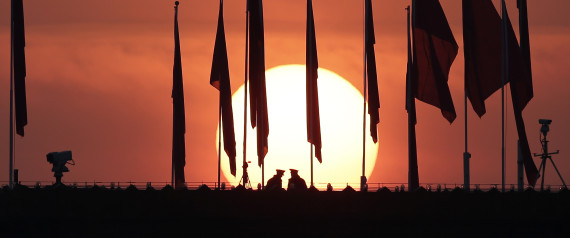BEIJING, June 10 (Reuters) - Chinese warships and aircraft on Wednesday passed through the Bashi Channel between Taiwan and the Philippines to hold routine planned exercises in the Western Pacific, China's Defense Ministry said.
China's increasingly assertive moves to press sovereignty claims in the East and South China Sea have rattled the region and aroused concern in Washington, although the country says it has no hostile intent.
China has overlapping claims with the Philippines, Vietnam, Malaysia, Taiwan and Brunei in the South China Sea, through which $5 trillion in ship-borne trade passes every year.
Wednesday's drills could cause alarm because of their location.
China claims self-ruled and democratic Taiwan as its own and has never renounced the use of force to gain control, while China and the Philippines have one of the most bitter disputes over the South China Sea of all the claimants.
The joint drills tested and perfected battle strategies and "achieved their expected aims," navy spokesman Liang Yang said in a ministry statement.
The exercises, in the waters east of the Bashi Channel, were routine annual drills, not aimed at any specific country or region and accorded with international law and practices, Liang said.
"During the drills there was no impact upon freedom of navigation or fly-through in the relevant seas or air," he added.
Such drills involving ships and aircraft far out at sea are common practice in other countries and normal for China's military.
"Going forward, similar drills and exercises will keep taking place," Liang said.
An official of the Philippine coast guard said it had noticed nothing unusual in the waters to the north of the country, where the Bashi Channel is located.
Taiwan's Defense Ministry said it monitored the drills closely, adding that it was not the first time China had done exercises in the area.
China has ramped up defense spending to modernize its forces, the world's largest, which are gaining experience in operating far from its coast.
In a defense strategy paper last month, China vowed to continue growing its "open seas protection" and criticized neighbors who take "provocative actions" on its reefs and islands. (Reporting by Ben Blanchard; Additional reporting by Manuel Mogato in MANILA and J.R. Wu in TAIPEI; Editing by Clarence Fernandez)
Original Article
Source: huffingtonpost.com/
Author: Reuters
China's increasingly assertive moves to press sovereignty claims in the East and South China Sea have rattled the region and aroused concern in Washington, although the country says it has no hostile intent.
China has overlapping claims with the Philippines, Vietnam, Malaysia, Taiwan and Brunei in the South China Sea, through which $5 trillion in ship-borne trade passes every year.
Wednesday's drills could cause alarm because of their location.
China claims self-ruled and democratic Taiwan as its own and has never renounced the use of force to gain control, while China and the Philippines have one of the most bitter disputes over the South China Sea of all the claimants.
The joint drills tested and perfected battle strategies and "achieved their expected aims," navy spokesman Liang Yang said in a ministry statement.
The exercises, in the waters east of the Bashi Channel, were routine annual drills, not aimed at any specific country or region and accorded with international law and practices, Liang said.
"During the drills there was no impact upon freedom of navigation or fly-through in the relevant seas or air," he added.
Such drills involving ships and aircraft far out at sea are common practice in other countries and normal for China's military.
"Going forward, similar drills and exercises will keep taking place," Liang said.
An official of the Philippine coast guard said it had noticed nothing unusual in the waters to the north of the country, where the Bashi Channel is located.
Taiwan's Defense Ministry said it monitored the drills closely, adding that it was not the first time China had done exercises in the area.
China has ramped up defense spending to modernize its forces, the world's largest, which are gaining experience in operating far from its coast.
In a defense strategy paper last month, China vowed to continue growing its "open seas protection" and criticized neighbors who take "provocative actions" on its reefs and islands. (Reporting by Ben Blanchard; Additional reporting by Manuel Mogato in MANILA and J.R. Wu in TAIPEI; Editing by Clarence Fernandez)
Original Article
Source: huffingtonpost.com/
Author: Reuters

No comments:
Post a Comment